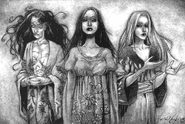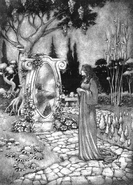Lilith is an obscure heretical figure in Noddist mythology, the first woman created by God.
Biography
According to a midrash, Lilith was the first wife of Adam, his co-equal and counterpart in power and wisdom. She split from Adam Kadmon, and as punishment God (also known as Jehova) banished her from Eden, replacing her by making Eve. Furthermore, God cursed Lilith to never know the love of another. In turn each being that Lilith truly loved and cared for, could never really love her in return.
Lilith's worshippers claim that Adam attempted to rape Lilith – or he may have actually done so – which prompted Lilith to flee from Eden (some accounts claim that the child of this rape was Ennoia, the Antediluvian progenitor of the Gangrel, or even the first of the Lamia).
According to the Bahari, however, Lilith enjoyed an extensive sequence of affairs with both Jehovah and Lucifer, who were gods with their own Gardens. Lucifer was said to have given Lilith the "cloak of night" as a gift after she had wandered the lands outside of Eden, scorched and tortured. She bore six children: three boys — Kessep (Silver), Shotheq (Silence), and Nesher (Eagle) — and three girls — Mem (Water), Oreb (Raven), and Laylah (Night).
Eventually abandoned by Jehovah and Lucifer, she met the wandering banished descendant of her ex-husband, the First Murderer (as named in the Bible) Caine. She took Caine in, tended to his injuries, fed and healed him, and taught him secret wisdom – the seeds of which blossomed into the vampiric Disciplines.
And how does he repay her? By abandoning her as well, to wander forever apart, mother of monsters and thief of infant breaths. Caine goes on to found Enoch and Lilith leaves the scene.
This apocryphal story is detailed in the Book of Nod as the Cycle of Lilith and in the Revelations of the Dark Mother, a Bahari text which tells the Book of Nod from Lilith's perspective. Some say the story lends evidence to support the theory that Lilith was one of the first mages, perhaps one of the predecessors of the Verbena.
In modern nights, the Path of Lilith is a Path of Enlightenment in the Sabbat. Bahari believe that pain is the road that leads to wisdom, and that true love involves more than a little screaming and more than a lot of blood. The Lilins are not exclusively a vampiric cult, however; their predecessors worshipped Lilith as mortals, until the Lamia were Embraced by Lazarus.
The modern Verbena believe that Lilith was one of the Wyck, the First Ones, and that she embodies dark femininity. Verbena legend hold that Lilith carved numerous Realms within the Umbra and that she eventually retreated there to watch over her manifold children. Most Verbena are not sure if she still exists or if she is benevolent (her goal does not seem to be Mass Ascension). Those that believe her to be a mage claim that she is the most powerful Oracle left in the world.
Book of Nod
In Aristotle de Laurent's English translation of the Book of Nod, Lilith features prominently in The Chronicle of Caine. However, in his commentary de Laurent mentions that his preferred translation for the character's introduction actually featured Ishtar instead of Lilith (based mainly on the description), but that he retained the more traditional interpretation.[1]
Trivia
This character derives from the mythical Lilith. Originally she was a female demon who formed part of Babylonian and Canaanite pagan religion. Lilith was incorporated into the religion of the ancient Hebrews and is mentioned in Isaiah 34:14. The revised standard version of the Bible refers to her as a "Night Hag". She was believed to be a female demon that seduced men, terrified children at night, etc. Some later Jewish sources identified her as the first wife of Adam, created at the same time as he was. She did not submit to Adam's will and was banished from the Garden of Eden.
Gallery
References
- ↑ VTM: The Book of Nod, p. 58
- VTM: Revelations of the Dark Mother
- VTM: Gehenna - "Fair is Foul"
- VTM: Encyclopaedia Vampirica, p. 107
- VTM: Clanbook: Gangrel, p. 11

- VTDA: Giovanni Chronicles II: Blood & Fire, p. 93

- MTAs: Tradition Book: Verbena, p. 85



